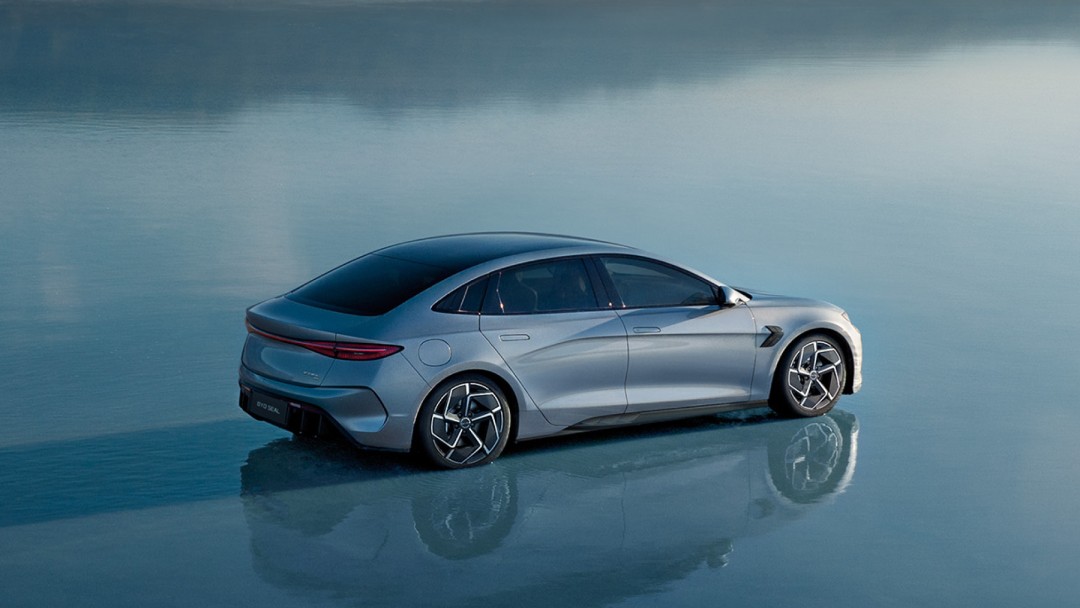“Tesla Killer” BYD to Launch Seal EV; Tata Motors Reduces EV Prices
The Seal EV joins BYD’s existing electric vehicle lineup in India, which includes the Atto 3 electric SUV and e6 MPV
Chinese car maker BYD, which is known as the “Tesla Killer” worldwide as it overtakes the sales of Tesla across global markets, is set to launch its highly anticipated Seal EV in India on March 5. This will mark BYD’s third model introduction in the Indian market. The Seal EV joins BYD’s existing electric vehicle lineup in India, which includes the Atto 3 electric SUV and e6 MPV.
Globally available with two battery pack options, the Seal EV will compete with models such as the Kia EV6 and BMW i4 in India. It will also rival the upcoming Hyundai IONIQ 6. The smaller 61.2 kWh battery pack offers a claimed range of up to 500 kilometres, while the larger 82.5 kWh unit boasts a range of up to 700 kilometres. Both battery packs feature fast charging capabilities, with the larger one supporting up to 150 kW charging.
The Seal EV will be offered in two powertrain configurations: a single-motor setup available with both battery packs and a dual-motor setup exclusive to the larger battery pack. The India-spec variant will feature the dual-motor all-wheel-drive setup, delivering 530 bhp and achieving a 0-100 kmph time of just 3.8 seconds.
Measuring 4,800mm in length, 1,875mm in width, and 1,460mm in height, with a wheelbase of 2,920mm, the Seal EV follows BYD’s ‘Ocean Aesthetics’ design language. Inside, it will feature a 15.6-inch rotating infotainment system, a 10.25-inch digital instrument cluster, and a head-up display.
The expected starting price for the BYD Seal EV is around Rs. 60-70 lakh (ex-showroom). With its premium features and performance, the Seal EV is expected to make a significant impact in India’s electric vehicle market upon its launch.
Tata Motors Reduced Prices of EVs by 8%
In a significant move that makes buyers happy, Tata Motors has announced substantial price cuts for its electric vehicles (EVs), reducing costs by up to 8 per cent, amounting to 120,000 rupees. This marks the first instance of an electric carmaker in India implementing price reductions. Despite the growing interest in electric vehicles, they currently constitute only two per cent of car sales in India, largely due to concerns over high upfront costs.
The reduction in prices is a strategic decision by Tata Motors to pass on the benefits of reduced battery prices directly to its customers. Vivek Srivatsa, Chief Commercial Officer at Tata Passenger Electric Mobility, emphasized, “With battery cell prices having softened in the recent past and considering their potential reduction in the foreseeable future, we have chosen to proactively pass on the resulting benefits directly to customers.”
Under these revised prices, the popular Nexon EV now sees a reduction of 1.4 per cent, with prices starting at Rs 14,5 lakhs, down from the previous Rs 14.7 lakhs. Additionally, the price of the Tiago electric car has been slashed by Rs 70,000, making the base version approximately 8.9 per cent more affordable at Rs 799,000.
FAME-II incentives for EVs to be offered on ex-factory prices: Govt
In a setback to the growing electric vehicle segment, the Ministry of Heavy Industries has announced a revision in the FAME-II incentives. FAME incentives were designed to boost the demand for electric vehicles across the country. Under the new directive, incentives will now be calculated based on the ex-factory price of electric four-wheelers and e-three-wheelers. Earlier the incentives were on their ex-showroom price. The ex-factory prices exclude GST, freight charges, and dealer margins. This adjustment was recently communicated through a Gazette notification. With just over a month and a half remaining before the FAME-II policy expires on March 31, the government says this change aims to streamline pricing dynamics and ensure uniform treatment across vehicle segments.
Dr Hanif Qureshi, Additional Secretary of Heavy Industries, confirmed that the updated scheme would apply immediately to all new sales, without retrospective effect. He highlighted that this modification addresses disparities in ex-showroom pricing across states and aligns all vehicle segments under the same policy framework. This adjustment follows a precedent set in 2023, where incentives for two-wheelers were similarly calculated based on ex-factory prices.
Also Read
Sajjan Jindal’s JSW to Invest Rs 40,000 cr in Odisha to Set Up EV Plant

